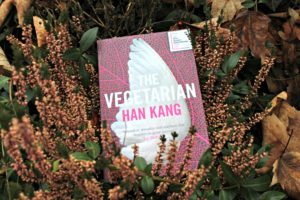This is a story about one woman’s journey for individuality that sends ricocheting shockwaves through her entire family. In The Vegetarian, Kang tells a story that evokes acts of sexuality, rebellion, and free will.
Summary
One night, a dream of meat, blood, and consumption haunts Yeong-hye’s sleep. From this point forward, her whole life will change. She refuses to eat meat. This single decision exposes the fragility of her family, as her relatives are threatened by her disobedient act of rebellion. But this decision has further implications, waking up desires in Yeong-hye, that were previously unacknowledged. And her decision not to eat meat will awaken other desires – the desires of others – and change the family forever.
Review
(TW: rape and physical abuse)
Strikingly Kang never allows us to see within Yeong-hye’s mind, explicitly. And while this may be disarming, it is actually a brilliant narration technique. Instead of knowing her exact thoughts, we merely observe the ripples her actions have in the pools of her family. Her decision to become a vegetarian introduces a constant tidal wave into her family sea. Unknowingly the undertow of her decisions pull other family members down and spits them out, changed forever. Kang allows us the same outside perspective of the narrators, and so we partake in their confusion and anger.

We witness the consequences and ramifications of her actions through the perspectives of her husband, her brother-in-law, and her sister. Her rebellious act disrupts the status quo in a way that may be unrecoverable, tipping dominoes and subconscious desires in each of the narrators. I have been fascinated with eating culture ever since my time at University, and this book is the epitome of the cultural effect of eating. Yeong-hye’s actions are rebellious. It is not only in her desire not to eat meat, but in her blatant disregard for social acceptance, for obedience, and for the self-preservation of ourselves in exchange for the death of animals. Her simple decision unsettles everyone she comes in contact with, and Kang masterfully demonstrates to us the impact our eating choices have on ourselves and our role in society.
Themes
Kang also explores questions of sexuality and awakening. This one decision seems to release the dam of Yeong-hye, as she becomes more willing to subvert the societal ‘norms’. And there lies the danger. Because when we have people who are willing to make us see how fragile our family or our society is, that is when we have to ‘starve’ them – to make them ‘abnormal’ in a way that will reinforce the very standards of society we want to create the illusion of ‘normalcy’. When does our body cease to be ‘our’ body and becomes incorporated into the ‘societal’ body?
Overall,
Suffice it to say, this book is brilliant. I read Human Acts before, but because of the way this deals with eating culture, and how passionate I am about it, this book may have just surpassed it. There is an exceptional brilliance to Kang’s writing in this book – not only in her exploration of the themes of eating and obedience, but also in her narrative choices. It is entrancing as it unfolds – unfurling like a majestic bird. The Vegetarian is thought provoking, regarding the decisions that chain us, on the subversion that lurks underneath the surface, and on the fragile foundation that society stands upon.
You should pick up The Vegetarian from Amazon(US), your local indie, and add it to Goodreads.
Discussion
Do you know any other vegetarian characters?
Subscribe for more reviews
If you liked this, check out my review of Human Acts.
I’ve been hearing a bit about this book and since I usually eat vegan, I was quite intrigued in the premise. It’s so weird how other people get annoyed when you decide not to eat meat.
I know, they feel like it is an affront to them. It’s a very personal issue for them. Clearly -_-